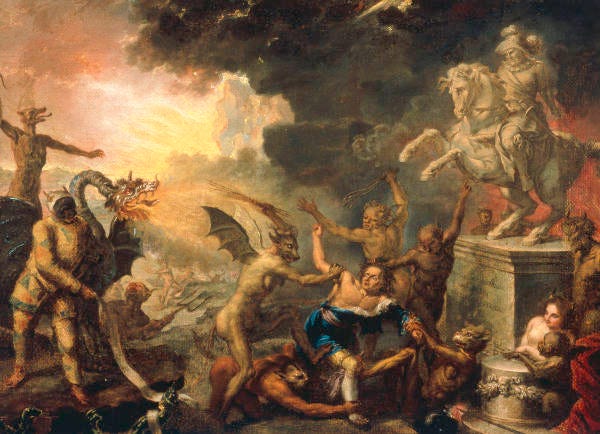
I have resisted writing about my favorite opera performances because watching or listening to opera at home is just such a poor substitute. To be in the theater, whether it’s on stage, in the pit, backstage, or an audience member is completely impossible to replicate in your living room. But with Mozart’s great opera, Don Giovanni, we are lucky to have such great performances to watch, as well as many indispensible recordings, that we can get as close as possible to the real thing.
Don Giovanni was premiered not in Vienna, but in Prague’s National Theater (now called the Estates Theater), on October 29, 1787, with Mozart conducting. While Mozart’s popularity ebbed and flowed in Vienna, his music was always received with incredible enthusiasm in the Bohemian capital and it was his previous visit just eight months previous in January/February of 1787 that prompted the commission for this opera. It was an enormous success. With additional arias and ensemble pieces, as well as a few cuts, Mozart conducted the Vienna premiere in May, 1788, and it has remained in the operatic repertoire ever since.
I can’t think of anything closed to true time travel than listening to historical recordings. One of my favorite performances of Don Giovanni is from a Metropolitan Opera broadcast from 1942, with Bruno Walter conducting, and a leading Giovanni of his day, Ezio Pinza.
One of the most important documents of opera was a filmed performance of Don Giovanni at the 1954 Salzburg Festival. It is important for many reasons, not least of which being that for the overture one has the pleasure of seeing, in color, one of the last performances of the great conductor, Wilhelm Furtwängler.
One of the great reference recordings of this opera was made just five years later with who many consider to be one of the greatest bass-baritones to attempt the role, Cesare Siepi.
A fun discovery is a wonderful film from 1962 of the great Ferenc Fricsay conducting a performance at the Deutsche Oper, with Dietrich Fischer-Dieskau as the Don.
And, this brings me to one of my favorite interpretations, and that is Fricsay’s studio recording with basically the same cast.
Rene Jacobs has recorded very interesting interpretations of the Mozart operas with his period-instrument ensemble, Freiburger Barockorchester. Here is a great example of his playful and unique approach from the Baden Baden Festival.
And another from the 2002 Aix-en-Provence Festival with Daniel Harding conducting the Mahler Chamber Orchestra.
And here is a traditional, but beautiful performance and staging from 1987, with Ricardo Muti conducting La Scala.
And I leave you with a wonderfully filmed 2008 Salzburg Festival production with Franz Welser Most conducting.
